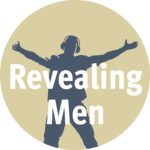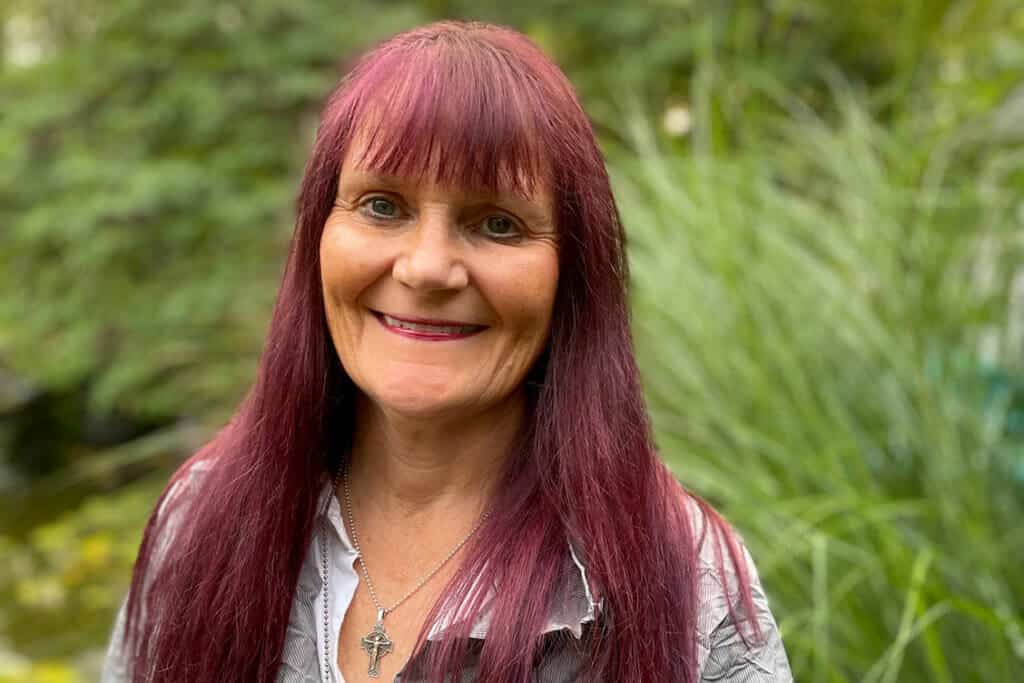

In her more than 30 years working as a therapist in the field of addiction medicine and mental health, Steff Condon says she has seen what she calls the “beautiful fruit” of recovery in lives changed by restoration and respect. Now in private practice, she provides individual and group counseling for men and women, counsels couples, leads two groups for Sanford House, an addiction treatment facility in West Michigan, and co-leads a men’s psychotherapy group at the Men’s Resource Center of West Michigan with psychotherapist, Randy Flood, its director, and co-founder. In this segment of the Revealing Men podcast, she and Flood sit down and talk about their experience counseling men. As they talk, they highlight the courage it takes for men to seek therapy and restoration. And they reflect upon the privilege they feel for witnessing the healing and transformation of men over time.
In the process, Condon discusses the respect she has for the men she counsels and the support men in her groups give to one another. She and Flood address the impact shame has on men and how gaining emotional intelligence can help resolve common misunderstandings between men and women. There’s a lot to unpack in this conversation between colleagues and friends. Throughout, their care and concern for the men they help is evident. You can hear the conversation in its entirety on the Revealing Men podcast on Spotify, Google Play, Stitcher, or Apple.
What Does Courage Look Like?
Condon describes her role working with men as to “help them to walk through their own fear and be willing to see other parts of their lives … to allow them the courage to address – particularly – their addictions.” “For guys, traditionally,” Flood responds,” courage can mean overcoming some kind of physical challenge: the courage to climb the mountain, the courage to go down the rapids in your kayak, or to put your head down at fourth and one and try to get a first down, … Describe this kind of courage you’re speaking of.”
“I think this courage is the courage to have the willingness to look at one’s actions and look at one’s situation and step underneath the situation and really be more honest with oneself,” Condon replies. “My work,” she continues, “is to help men look at their relationship with themselves and what their posture with themselves has been.” She notes that some men have a posture of avoidance, i.e., “I don’t want to feel anything. I just want to be numb.” Others are dealing with a “poor me” attitude or just want someone else to fix it. Condon wants men to recognize how that type of relationship with themselves can become abusive, self-abusive, and violent in the avoidance: “It’s violent to avoid taking care of myself. It’s violent to expect other people to always do that for me.”
“It’s interesting,” Flood observes, “because we focus on men’s violence towards others …but you’re speaking to this violence that they do towards themselves.” “I really encourage people to look at what they’ve done with their pain and how that’s really not working for them,” Condon responds, “But also looking at how it does take courage to go there; it does take courage to pause, it does take courage to do it differently than you’ve been wired to do it for so long.”
Validation and Support in a Men’s Group
At the end of her group sessions, Condon speaks an affirmation to each man: “The work you’re doing is worthy of respect.” It’s like “Don’t bail! Keep pushing!” she tells Flood. That encouragement is important, especially when it comes from the men in the group as well. “So, you think that it’s not just you, it’s not just me,” notes Flood, “but, there’s something powerful when these men validate and nurture and honor each other.” “And honor the challenge of the work,” continues Condon, “the courage to name what’s true. And the courage of being vulnerable and … [t]hat they make sense. That they’re o.k. That they’re not weak …”
This may be one of men’s biggest fears. That to connect with emotion means they’ll cry and end up being seen as ineffectual and weak. It’s important for men to see that emotion is a part of being human, Flood says: “This is part of your humanity. You were born to cry. You just lost your capacity. Lost your skill.” “Oftentimes in a men’s group,” he says, “I will ask what their memory is of being on a lap of their mom or a dad. And a lot don’t have any memory because it’s usually pretty early – three, four years old – where they’re saying go climb trees, go get your knees scabbed up, and be a real boy.”
How Shame Holds Men Back
Early in the conversation, Flood refers to Condon as a “master in utilizing experiential exercises in groups to get guys to the hidden “roots and feelings not spoken or even conscious of.” Condon uses experiential work to help cut underneath defenses and fears. It provides a different way to experience and see things – “without all the intellectual chatter” – she says. “I think it cuts through the defenses that protect the shame and keep people hostage.”
Condon goes on to list some examples of how shame is experienced. “The experience of feeling exposed. Of judgment. …The experience of recognizing I did something that violated my value system.” She relates how important it is for men to be able to share their feelings of shame honestly in a safe setting. “It’s a critical piece in any kind of growth,” she says, “to address how our shame holds us back. ‘Cause it’s also based on the lie that if other people saw this, they would just run away. And so, I’ve been running away. I’ve been running away from myself. I’ve been trying to make up for it. I’ve been doing all these other things to make you focus on those things, to not do my own work. And doing that work in a group and letting other people continue to love you and care about you when you’ve hurt yourself and you’ve violated your own compass code is so healing.”
Flood agrees. “I think to be in a room with guys and be able to take that mask off, put the armor aside, and to reveal what’s truly going on in your life. I think the fear is that I’m going to be shamed. Which, in some circles of men that does happen and we can appreciate why guys are really fearful of being vulnerable. But when you can do that in the company of other men, there is a lot of healing with that. And it gives other men permission – ‘wow, you feel that way too. I thought I was the only one.’”
Permitting Men to be Intimate
Women do a disservice to men, Condon believes, when they say “all men want is sex!” “I think it diminishes the humanity of men,” she says, “and it also diminishes the humanity of women in terms of just being individuals and people and multi-faceted. …[it] just sabotages real relationships and real intimacy and is really a tragedy.”
This stereotype is encouraged in part by our culture, Flood says. “We train boys to have this non-relational look at sex as a conquest. …And so, if you disconnect boys from the heart and don’t give them other ways of experiencing intimacy – sitting down and being emotional and close with another man or a woman without sex being involved – then sometimes sex becomes the only vehicle for human connection and for intimacy.” Men need to be permitted to experience intimacy in more ways than just sexual contact.
“Sometimes I think women want to hear men’s own struggle with things,” Condon observes. To be honest and to move beyond just saying they’re sorry. “Making it deeper and really bridging the relationship rather than just kind of shoving it off or sluffing it off …,” she continues, “being willing to ask questions and to go deeper with that: ‘how did that hurt you?’ ‘Why did that make you so mad?’ ‘What’s that really about?’”
“What I hear you saying,” Flood responds, “is that you want to have a deeper conversation about ‘what was going on with you’ or ‘what got triggered’ or ‘what is this connected to,’ so there’s a deeper awareness of it.’” “Yes,” says Condon, …” It’s like having that depth of intimacy in terms of both being on a parallel path of healing and being able to support each other in that and being open to that. I think that that is a beautiful healing journey for men and women together.”
Flood and Condon both view emotional and relational intelligence as essential to success in recovery and relationships. Flood says, “So much that we do in group is to teach those skills and … it is a skill. You’re not born with it. You’re born with emotional resources. You can see a baby, a toddler, be sad, angry, and scared. It’s unbridled. It’s full and large. The resources have to turn into an intelligence. And then that intelligence can transfer to relational intelligence in terms of not only what’s going on with me but I want to be curious of what’s going on with you. And then having this dialogue about that.”
The Privilege of Working with Men
Near the conversation’s end, Flood affirms the courage of the men who actively sign up for men’s support groups and therapy. The men who are taking the first steps toward developing the language of emotional and relational intelligence. In Condon’s words, “It is a sacred privilege to be able to do this work and to hold people’s trust and be able to encourage and confront and to do that with colleagues.”
To someone who might be thinking about getting into therapy, Condon says “Come! Come and see! Come and watch. Come and be part of it. Take a risk. Exhale fear. Exhale the lie of fear. It’s a different kind of mountain.”
If you’re curious about experiential therapy, our online men’s support groups, or counseling and consultation, contact the Men’s Resource Center online or call us at (616) 456-1178. Also, feel free to reach out if you have questions about this segment, ideas for a topic, or would like to be a guest on the Revealing Men podcast.

Leave A Comment